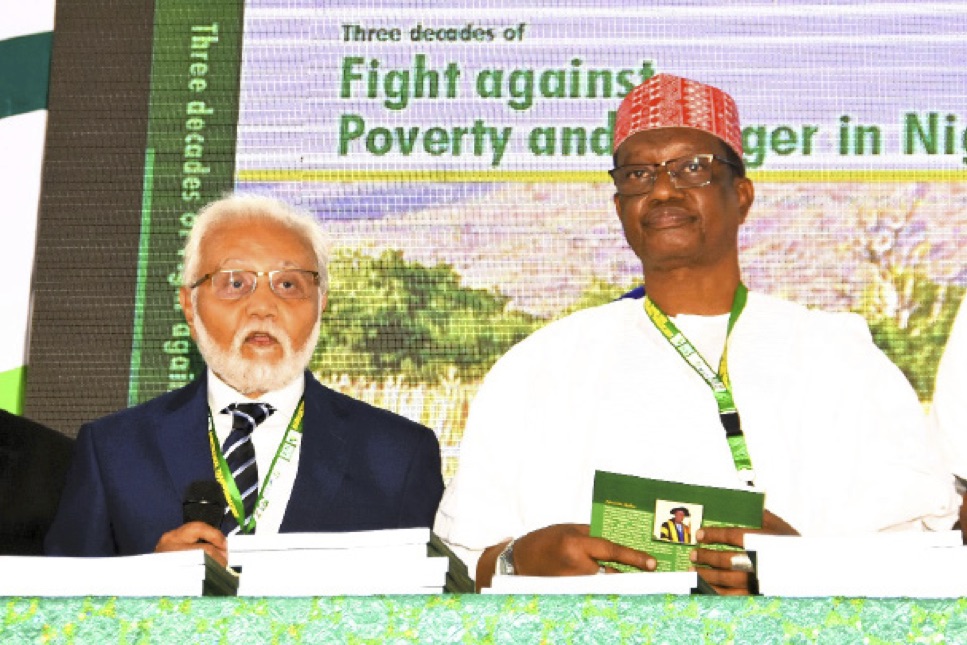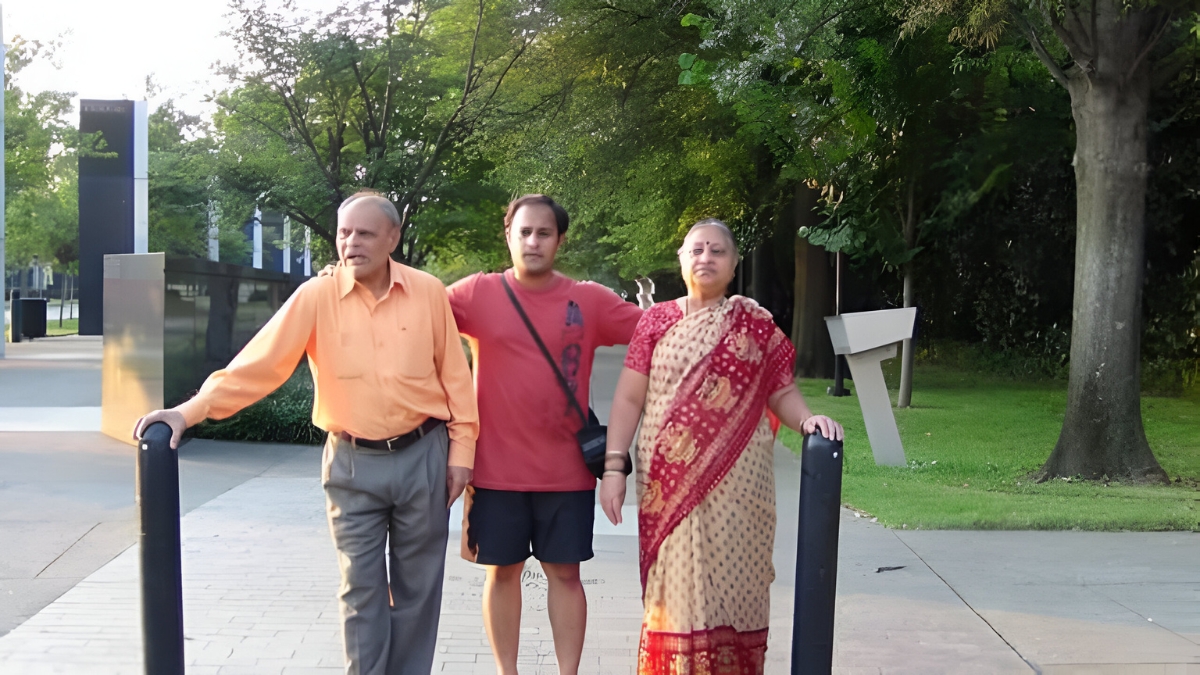■ KSAPD, SAA take agric to higher level at grassroots
From Desmond Mgboh, Kano
A few days ago, an agricultural workshop, Agricultural Transformation and What Works: Reflections from the Crop Value Chain of the Kano State Agro-Pastoral Development, was held. It was chaired by the former President Olusegun Obasanjo, represented by Vitalis Ortese and attended by experts from all over the world.
“The workshop was organised to reflect on the gains made by the Kano State Agro Pastoral Development Projects (KSAPD), towards agricultural transformation with a view to providing a template for scaling of innovations to new geographies. It is also a platform for reprogramming and capitalising on lessons learned,” Moses Nongoatse, Country Communications Officer, Sasakawa Africa Association, Nigeria, told Daily Sun.
Obasanjo urged participants to deliberate on the theme with a view to enhancing food security and better lives for all. Commissioner for Agriculture, Mahmoud Danjuma, said the goals of KSADP were in line with the agricultural programmes of the state government: “Government will sustain and scale up all the facilities and supports provided by the partners and ensure the sustainability of the project even after the expiration of the five-year programme.”
He stressed the willingness of the state to peer review and make available its knowledge to states in Nigeria who are interested in leveraging on the success of the project even as he lauded the donors’ due diligence mechanisms, which he noted were catalysts for the recorded success.
Dr Godwin Atser, Country Director, Sasakawa Africa Association (SAA), said: “Today, we celebrate not only the industry that feeds us but also the hard work, dedication, and innovation of those who cultivate and nurture the land.
“Our focus is on KSADP, which is a five-year project that is being funded by the Islamic Development Bank (IsDB), Lives and Livelihoods Fund (LLF), Kano State Government and implemented by SAA, Nigeria. KSADP is conceived to address the dwindling fortunes of agriculture. The project has positively impacted on the agricultural sector and the livelihoods of farmers.
“The project has made significant strides in enhancing the productivity and competitiveness of cereals and vegetables under the crops value chains component in Kano State.
“The gains of the project include spectacular yield increases on all targeted commodities including rice, maize, sorghum and millet. The yield increases and value-adding activities resulted in increased income ranging from $100 to $800/hectare depending on crop value chain chosen by the participating farmers.
“About 854 frontline extension personnel received training on various aspects of the value chain and were equipped with 220 motorcycles and 380 tablets for data collection apart from providing them with monthly stipends.
“The project established and supported 5,348 clusters with capacity-building and inputs for grains/vegetables production enhancement and 1,237 clusters to strengthen seed system.
“KSADP established 54 agro-processing centres, three parabolic vegetable solar drying centres and 23 onion solar drying facilities; trained and empowered the benefitting communities with starter-packs. They have also enhanced linkages between primary producers and input/output market actors across value chains.
“The workshop has assembled farmers, researchers, policymakers, innovators and community members, each of whom plays a vital role in driving agriculture forward.
“Our sessions today are filled with opportunities to learn, collaborate, and explore new paths. So, as we dive into these discussions and activities, let’s keep in mind that the future of food security, climate resilience, and rural development rests on the collective efforts we make here.”
Chairman, SAA, Dr. Amit Roy, said: “From the beginning, SAA believed that that Africa farmers hold the key to the continents future, but also was convinced that others in the agricultural value chain are as important to make agriculture remunerative and aspirational for the youth.
“SAA’s journey has been one of growth and transformation. These success stories underscore the importance of working alongside farmers, learning from them, and adapting our approaches to meet their evolving needs.
“KSADP is a shining example of how partnerships between governments, international organisations and technical experts can lead to sustainable change. SAA remains committed to playing a key role in these partnerships, fostering innovation and resilience in agriculture using new technologies.
“The project has already achieved significant milestones and SAA is proud to be a technical partner in implementing its crop value chain component, contributing to the enhancement of agricultural productivity. It addresses issues related to low agricultural productivity and the challenges posed by poor soils and climate change.
“But beyond the specifics of this project, SAA has embodied the spirit of perseverance, the belief that no challenge is too great if met with determination and collaboration.”
At the end of its sessions, the workshop resolved: “Agriculture is pivotal to Africa’s development considering that the sector employs more than 70 per cent of people in the rural areas and contributes to improved livelihoods and prosperity of the people.”
It acknowledged the commitment and coordination between and among the implementing partners and project components resulting in positive achievements. It recommended that the same scenario in Kano be replicated to other geographies for the benefit of agricultural development.
The workshop noted with concern the glaring challenges of climate change on agriculture and therefore emphasised the need for expanding the adoption of climate-resilient crops and technologies to mitigate the adverse effects of climate change.
The workshop also acknowledged the perennial problems of smallholder access to credits and thus, called for innovative financing models tailored to smallholder farmers, including microcredit schemes and agricultural insurance to boost farmers’ financial resilience.
It equally noted the importance of basic infrastructure to the advancement of agriculture, though the current situation of rural infrastructure is anything but satisfactory. Thus, the meeting emphasized a critical need for more investments in rural infrastructure such as irrigation systems, roads, and storage facilities to support agricultural transformation and reduce post-harvest losses.
It appreciated the efforts of the KSADP in its efforts to expose beneficiaries to value-adding enterprises and therefore, highlighted the importance of encouraging more local agro-processing industries to create jobs and increase income for farmers.
It recommended that private sector play a more active role in driving agricultural innovation and investment, particularly in areas like input supply, mechanization, and market development.
The workshop appreciated the realities of digital innovation in agricultural transformation, emphasising that digital technologies such as mobile-based market information platforms, financial services, and precision farming tools should be harnessed to improve efficiency and productivity across the crop value-chain.
The workshop expressed the need to leverage on the existing funding windows available with the ISDB and on this note, agreed to ensure sustained partnership in supporting the intending participating states and nations to key into the funding opportunities existing in the Islamic Development Bank.
Others present at the workshop included Muhammad Al-Jasser, President, Islamic Development Bank (represented); Governor Abba Kabir Yusuf, represented by his deputy; governors of Gombe, Jigawa, Benue and Katsina states, represented by their Commissioners for Agriculture and delegation of the Nigeria Governors Forum (NGF). Also in attendance were farmers, researchers, policymakers, innovators and community members from the North, Nigeria and beyond.





